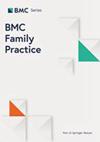Factors associated with plans for early retirement among Ontario family physicians during the COVID-19 pandemic: a cross-sectional study
IF 3.2
3区 医学
Q1 MEDICINE, GENERAL & INTERNAL
引用次数: 0
Abstract
Higher numbers of family physicians (FPs) stopped practicing or retired during the COVID-19 pandemic, worsening the family doctor shortage in Canada. Our study objective was to determine which factors were associated with FPs’ plans to retire earlier during the COVID-19 pandemic. We administered two cross-sectional online surveys to Ontario FPs asking whether they were “planning to retire earlier” as a result of the pandemic during the first and third COVID-19 pandemic waves (Apr-Jun 2020 and Mar-Jul 2021). We used logistic regression to determine which factors were associated with early retirement planning, adjusting for age. The age-adjusted proportion of FP respondents planning to retire earlier was 8.2% (of 393) in the first-wave and 20.5% (of 454) in the third-wave. Planning for earlier retirement during the third-wave was associated with age over 50 years (50–59 years odds ratio (OR) 5.37 (95% confidence interval (CI):2.33–12.31), 60 years and above OR 4.18 (95% CI: 1.90-10.23)), having difficulty handling increased non-clinical responsibilities (OR 2.95 (95% CI: 1.79–4.94)), feeling unsupported to work virtually (OR 1.96 (95% CI: 1.19–3.23)) or in-person (OR 2.70 (95% CI: 1.67–4.55)), feeling unable to provide good care (OR 1.82 (95% CI: 1.10–3.03)), feeling work was not valued (OR 1.92 (95% CI: 1.15–3.23)), feeling frightened of dealing with COVID-19 (OR 2.01 (95% CI: 1.19–3.38)), caring for an elderly relative (OR 2.36 (95% CI: 1.69–3.97)), having difficulty obtaining personal protective equipment (OR 2.00 (95% CI: 1.16–3.43)) or difficulty implementing infection control practices in clinic (OR 2.10 (95% CI: 1.12–3.89)). Over 20% of Ontario FP respondents were considering retiring earlier by the third-wave of the COVID-19 pandemic. Supporting FPs in their clinical and non-clinical roles, such that they feel able to provide good care and that their work is valued, reducing non-clinical (e.g., administrative) responsibilities, dealing with pandemic-related fears, and supporting infection control practices and personal protective equipment acquisition in clinic, particularly in those aged 50 years or older may help increase family physician retention during future pandemics.COVID-19 大流行期间安大略省家庭医生提前退休计划的相关因素:横断面研究
在 COVID-19 大流行期间,越来越多的家庭医生(FPs)停止执业或退休,加剧了加拿大家庭医生短缺的状况。我们的研究目标是确定哪些因素与家庭医生在 COVID-19 大流行期间提前退休的计划有关。我们对安大略省的家庭医生进行了两次横断面在线调查,询问他们是否因 COVID-19 第一波和第三波流行病(2020 年 4 月至 6 月和 2021 年 3 月至 7 月)而 "计划提前退休"。我们使用逻辑回归法来确定哪些因素与提前退休计划相关,并对年龄进行了调整。经年龄调整后,计划提前退休的 FP 受访者比例在第一波为 8.2%(393 人),在第三波为 20.5%(454 人)。在第三波调查中,计划提前退休与年龄超过 50 岁(50-59 岁的几率比(OR)为 5.37(95% 置信区间(CI):2.33-12.31),60 岁及以上的几率比(OR)为 4.18(95% 置信区间(CI):1.90-10.23)、难以处理增加的非临床职责(OR 2.95(95% CI:1.79-4.94))、感觉没有支持以虚拟方式工作(OR 1.96(95% CI:1.19-3.23))或亲自工作(OR 2.70(95% CI:1.67-4.55)、感觉无法提供良好的护理(OR 1.82(95% CI:1.10-3.03))、感觉工作不受重视(OR 1.92(95% CI:1.15-3.23))、感觉害怕与 COVID-19 打交道(OR 2.01(95% CI:1.19-3.38))、照顾年长亲属(OR 2.36(95% CI:1.69-3.97))、难以获得个人防护设备(OR 2.00(95% CI:1.16-3.43))或难以在诊所实施感染控制措施(OR 2.10(95% CI:1.12-3.89))。超过 20% 的安大略省 FP 受访者考虑在 COVID-19 第三波大流行时提前退休。支持家庭医生的临床和非临床角色,使他们感到能够提供良好的医疗服务,他们的工作受到重视,减少非临床(如行政)责任,处理与大流行相关的恐惧,支持诊所的感染控制实践和个人防护设备的购置,尤其是那些年龄在50岁或以上的家庭医生,这可能有助于在未来的大流行期间提高家庭医生的留任率。
本文章由计算机程序翻译,如有差异,请以英文原文为准。
求助全文
约1分钟内获得全文
求助全文
来源期刊

BMC Family Practice
医学-医学:内科
CiteScore
3.20
自引率
0.00%
发文量
0
审稿时长
4-8 weeks
期刊介绍:
BMC Family Practice is an open access, peer-reviewed journal that considers articles on all aspects of primary health care research. The journal has a special focus on clinical decision making and management, continuing professional education, service utilization, needs and demand, and the organization and delivery of primary care and care in the community.
 求助内容:
求助内容: 应助结果提醒方式:
应助结果提醒方式:


